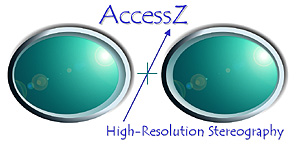Passion
Countless hours of research and study have been invested
across more than 20 years to satisfy an obsession with achieving
unparalleled image clarity - to produce images so lucent, so devoid of
any hint of the underlying medium, that we can easily forget we are
looking at a reproduction of the actual scene. In two-dimensional art
this is known as
plasticity.
Every controllable variable affecting image clarity had to
be identified and field techniques perfected such that the
"building blocks" of the image, as seen in the final view, are
at least half again as small as can be resolved by the average adult with
healthy vision. We simply are not capable of seeing sharper images than these.
In October of 2000, techniques developed over many years of working within
the confines of two-dimensional photographs were
successfully merged with stereography. The fruit
of this passion for plasticity can be seen in every stereograph produced by
AccessZ.
Precision
The finest
equipment currently offered for this format is used in the creation of AccessZ
High-Resolution Stereographs. Laser rangefinders and a sonic measuring tape are
meticulously employed to measure camera-to-subject distances for
each shot. A programmable calculator is used with the measured distances
and other variables to translate the geometry of the scene into camera
settings that will aesthetically reproduce the subject space within the stereo
viewer while imparting the plasticity that can only come with high resolution,
extreme depth of field, precluded diffraction, generous tonal
gradations, and the absence of visible grain.
Focusing
is itself done with great precision, using the laser rangefinder or sonic
measuring tape to verify the focus is set to a calculated optimum distance for
each scene. Heavy, solid camera mounts are used to
deter image
degradation due to camera movement. Well-honed techniques for in-camera contrast control are applied
when needed
to elevate shadows in scenes with excessive luminance ranges. Mounting of views is done using vernier calipers, under
magnification at a light table, to carefully measure relative distances of
homologous points in each chip to the surrounding mask borders. This
ensures that
there is absolutely no yaw, no height disparity, and no chance of an on-film
deviation that would be uncomfortable to view.
All of
these processes were developed to provide consistent, reproducible control of
the variables affecting stereographic image quality. To our knowledge, this precision
stereography is available from only one source: AccessZ.
and Patience
Every controllable variable affecting both 2D and 3D image quality, is
painstakingly addressed in a multi-step process that averages about 20 minutes
of setup time for each new subject. Some shots, especially those
requiring artificial lighting, have taken longer than an hour to
assemble. The mounting of each view can take several minutes and is made
tedious by our intolerance for error. Adhering to a
weakest-link-in-the-chain strategy requires an unfaltering commitment to
quality, but produces the very finest 3D images available.
